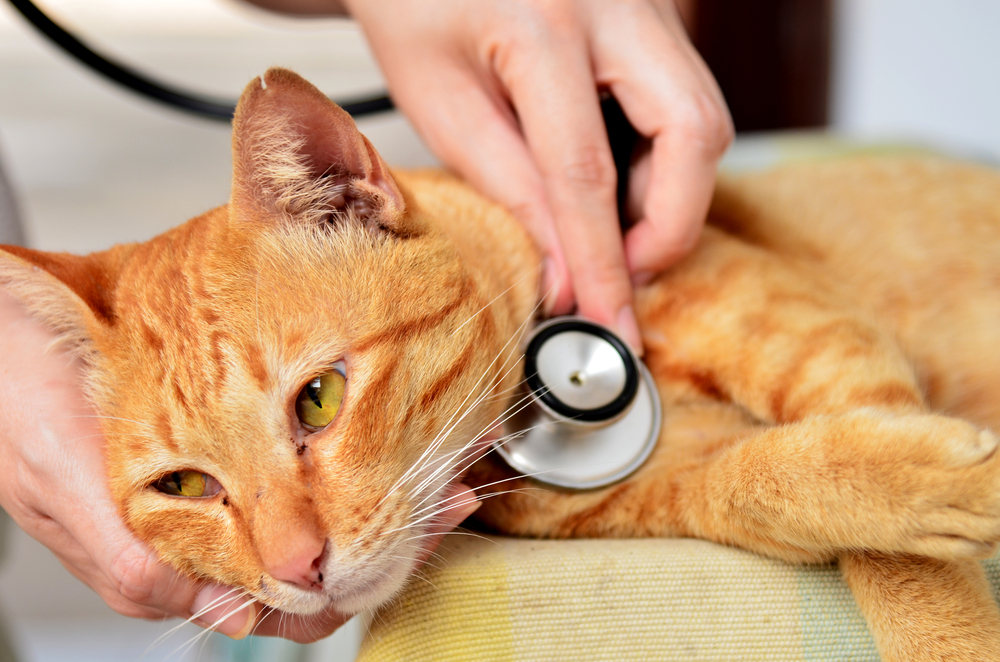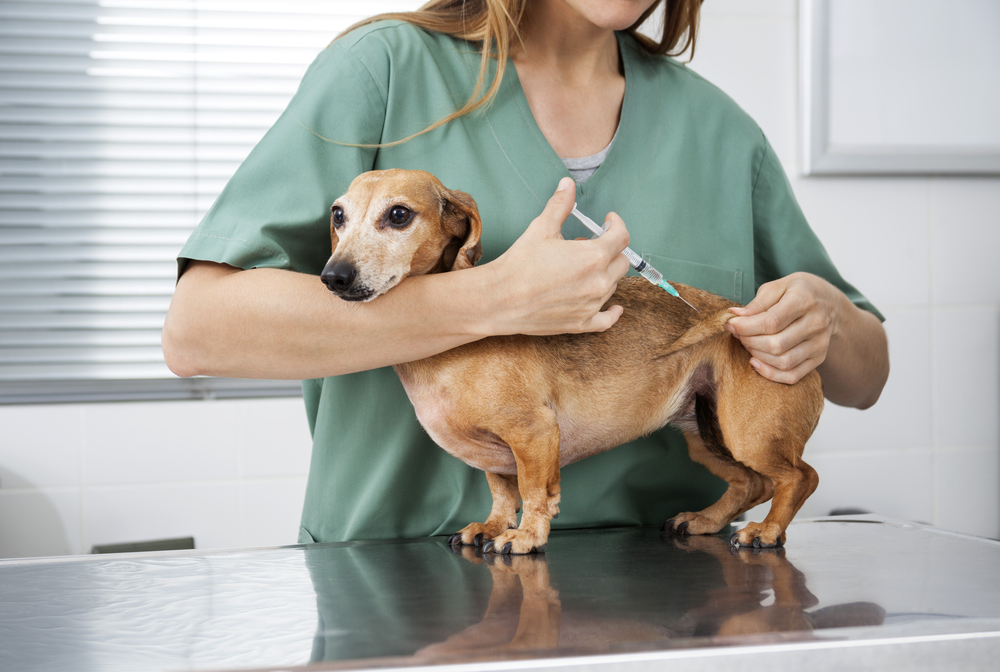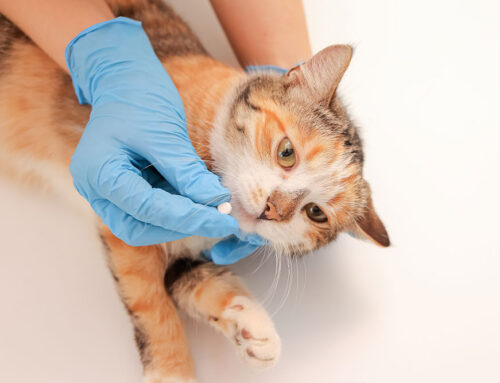Your pet’s vaccinations are essential to their overall health. Many vaccinations are available to pets, some—such as rabies—are required, and your veterinarian strongly recommends others that are recommended on the basis of your pet’s lifestyle and other unique factors. Our WesVet Animal Hospital team takes an individualized approach to vaccine protocols to ensure your pet receives precise protection to fit their health, physical needs, and lifestyle. To ensure we make specific and informed vaccination recommendations, we review your pet’s risk factors at every wellness visit. To better understand each of your pet’s vaccines, learn about the conditions they protect against.
Rabies vaccination for pets
Perhaps the most infamous pet vaccine protects against the rabies virus, which attacks the central nervous system, and is transmitted through bite wounds. As a zoonotic disease—able to be transmitted from pets to humans—the rabies virus is a serious public health threat. The disease is found worldwide in mammals, including bats, dogs, racoons, skunks, coyotes, and foxes, and fatal once clinical signs appear. As the deadly virus attacks nervous system tissue, victims’ behavior changes—typically becoming aggressive or excessively fearful—and they experience progressive paralysis. The State of Tennessee requires that dogs and cats older than 6 months of age be vaccinated against the rabies virus.
Canine distemper and parvovirus vaccination
The combination vaccine—DHPP or DA2PP—protects puppies and dogs from several contagious canine viruses, including canine distemper, parvovirus, adenovirus (i.e., hepatitis), and parainfluenza.
Canine distemper is a highly contagious pathogen that commonly strikes unvaccinated or incompletely vaccinated puppies who have inadequate immunity. Distemper is a multisystemic virus that affects the respiratory, gastrointestinal, and nervous systems. Infected pets must be hospitalized and receive supportive care, which are not always curative measures. Survivors may experience permanent organ or neurologic damage. Fortunately, the distemper vaccination is effective protection against this heartbreaking disease.
Puppies and unvaccinated adult dogs also have a high risk of contracting parvovirus (i.e., parvo), another incredibly contagious and dangerous virus. Parvovirus signs include depression, lethargy, inappetence, vomiting, and diarrhea, which lead to severe dehydration and intestinal lining sloughing—making nutritional absorption impossible. Despite aggressive hospitalized care, parvo has a 50% mortality rate in unvaccinated or incompletely vaccinated dogs and puppies—making vaccination absolutely crucial.
Bordetella vaccination for dogs
Bordetella is part of the kennel cough complex of respiratory infections commonly transmitted in areas where dogs frequent—shelters, boarding kennels, grooming and training facilities, and large dog-friendly events. Bordetella infection signs include a honking or gagging cough, and may include fever or nasal discharge. The condition is generally self-limiting, although antibiotics may be necessary to clear the infection.
Leptospirosis vaccination for dogs
Leptospirosis vaccination may be advised for active dogs who hunt, hike, or spend time among wildlife or farm animals. Urban dogs may encounter infected rodents or their waste. Dogs and humans can contract leptospirosis, which can lead to kidney disease or failure, various eye conditions, and death, but cats experience mild or subclinical signs only.
Lyme disease vaccination for dogs
Climate change and shifting migration patterns have led to a statewide increase in Lyme disease diagnosis. Lyme disease is a tick-borne bacterial infection that can cause painful and swollen joints, fever, lethargy, and intermittent lameness. Severely affected dogs may experience fatal kidney damage. In addition to their year-round parasite prevention, an at-risk dog’s Lyme disease vaccination provides an added protection layer.
Canine influenza vaccination
Similar to human influenza, canine influenza (H3N2 and H3N8) is a highly virulent flu that spreads rapidly in close quarters (e.g., kennels and shelters). Although healthy dogs experience mild to moderate signs, immunocompromised dogs can develop pneumonia—an extremely serious complication.
Feline viral rhinotracheitis and calicivirus vaccine
The feline combination vaccine FVRC protects your kitten or cat from highly contagious upper respiratory infections, which can lead to significant discomfort, including nasal congestion, difficulty breathing, inappetence, and painful eye or mouth ulceration. In severe cases, these viruses may be fatal. After clearing the infection, cats become lifelong carriers, and the virus may recur during stressful times.
Panleukopenia vaccination for cats
Before widespread vaccination, panleukopenia was the number one cause of death in kittens and cats. The virus—also known as feline distemper or feline parvo—attacks rapidly multiplying cells in the bone marrow and gastrointestinal tract, cripples the immune system, and causes severe dehydration and illness. Transmission may occur through contact with a contaminated environment or in utero if the mother cat harbors the virus. Early vaccination is the best protection against this heartbreaking condition.
Feline leukemia vaccination

Feline leukemia virus (FeLV) spreads through close contact with an infected cat’s bodily fluids (i.e., respiratory secretions, saliva, urine, or feces). Infected cats and kittens may show no signs for months or years before experiencing acute illness, compromised immunity, or cancers such as lymphoma or leukemia. Once an FeLV cat demonstrates clinical illness, diligent care and monitoring are necessary to ensure their remaining life is comfortable and pain-free. Effective protection against FeLV requires preventing exposure to FeLV-positive cats, performing in-house screening tests, and administering FeLV vaccinations.
Your pet’s health is as priceless as they are. Let our WesVet Animal Hospital team safeguard your beloved companion by providing comprehensive wellness care, individualized recommendations, and a tailored vaccine protocol. Contact our team to schedule your pet’s next appointment.







Leave A Comment